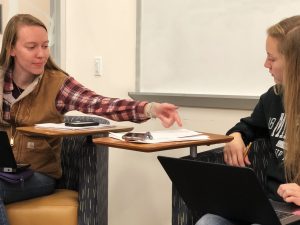
The origin of ISU ABE’s successful learning community is rooted in long-term retention efforts
In the fall of 1997, Iowa State University’s Agricultural & Biosystems Engineering (ISU ABE) Department saw a 33% decline in retaining incoming students.
This threw a then-new associate chair of teaching into a sticky situation. Steve Mickelson needed to find the cause of the decline in retention rates. Mickelson (who today is the chair of ISU ABE) looked to successful programs on campus and saw an answer … peer connections.
“The goal was to make sure students completed their assignments, got answers to their questions and communicated what was going well and what wasn’t going well to experienced upperclassmen,” Mickelson says.
If he could tie challenging courses together in a low-pressure group environment, Mickelson thought he might be able to stem the flow of students leaving the department. In the next several semesters, Mickelson studied various ISU ABE courses to see which were tripping points for students. Along with advisors and faculty, Mickelson suggested that ABE 170: Engineering Graphics and Introductory Design and a freshman English course be taken in conjunction with a hands-on experience course. A student would sign up for this combination of courses with a cohort of fellow new students.
Freshman were put into groups of 4-6 people per group with one upperclassman peer mentor. Freshman and transfer students were automatically enrolled in these courses in their first year. Within two years of starting this program, the department saw a 95% retention rate for students.
Ryan Benning (2003 B.S., 2005 M.S. agricultural engineering) is a former peer mentor and is currently on the corporate engineering mechanical team for Hormell Foods.
“The program was very beneficial and it made me feel more connected to the department,” says Benning. “It was my family away from my family.”
Today, students who are involved in the peer mentor program within the department have a 7% higher chance of sticking with ISU ABE for the duration of their college career.
“We have an environment that will help you be successful and have a better chance of being successful,” Mickelson says.
Sara Weyer is a peer mentor and has been for the past two semesters. She spends time each week meeting with her group. Weyer values the learning community ties that she’s made over her time at ISU ABE.
“You are able to build connections and be more interactive with this opportunity than other programs outside of ABE,” Weyer says.
